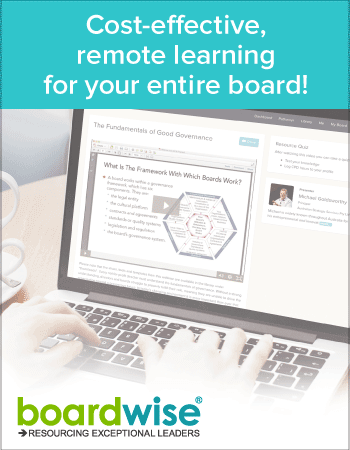governance
Keeping Charity and NFP Governance Front of Mind: The Pre- and Post-Merger Quandary
Published: November 11, 2019
Read Time: 6 minutes

With an increasing number of charities and not-for-profit organisations considering mergers and acquisitions, it is important for directors and management to keep governance front of mind. When governance is strong, it can keep your organisation grounded through the changes and uncertainty that will inevitably arise during merger and acquisition activity. However, with the myriad of factors at play during a transaction and the increased pressures on directors and management, it can be easy for governance considerations to take a back seat or become about ensuring baseline compliance.
The governance considerations in the lead up to a merger or acquisition, during the transition and after everything is completed will be different. Being comfortable and confident in how to distinguish between the pre- and post-merger governance context helps bring strong leadership and in turn helps build the same comfort and confidence in the key stakeholders (often directors, employees and members). This in turn can help make the merger transition and the inevitable change smoother and subject to less dispute and stress.
This article focuses on some key governance considerations in both a pre- and post- merger context, with the aim of enabling readers to engage in merger and acquisition activity with greater confidence and clarity, which can be a key factor in post-merger success.
Initial considerations
Organisations that are registered as charities with the Australian Charities and Not-for-profits Commission (ACNC) have unique governance considerations when deciding whether or not to take part in a merger or acquisition.
When considering merger and acquisition activity, there will obviously be the usual commercial considerations, including regarding financial positioning, cultural alignment and transition and any requisite organisational synergies. However, through a charity governance lens, directors should consider a number of factors, including:
-
the purpose and desired outcomes of the transaction, and any resulting shift in the organisation’s charitable or not-for-profit purposes;
-
whether changes will be required to the current board post-merger (discussed further below);
-
what changes, if any, will be required to the organisation’s constitution in order to allow for any changes to the composition of the board post-merger; and
-
whether there will be any impact on the organisation’s tax concessions and endorsements, including how potential negative impacts can be minimised or remedied.
Due diligence
Due diligence is perhaps the single most important part of any pre-merger activity. It enables those involved to better understand the legal, financial and cultural aspects of the proposed transaction, to identify risks, to develop strategies to mitigate any risks and ultimately decide whether to proceed with the transaction and, if so, on what terms.
As part of the due diligence phase, and throughout the process of the transaction, the directors should be attuned to their duties (including, for registered charities, the duties set out in the ACNC Governance Standards) and the impact that completing the transaction will have on the organisation. In the pre-merger context, each director will need to be satisfied that the transaction is in the best interests of the organisation, and that it will not result in the organisation becoming insolvent (or at risk of insolvency). While directors and senior managers should be firmly focused on the position of their organisation as it currently exists, being alive to transitional and post-merger governance requirements should not be ignored as they will be important when structuring the deal and crafting the transaction documentation.
Composition of the board
As part of focusing on governance, the current directors will likely need to consider the composition of the organisation’s board in the post-merger context. This will involve:
-
understanding the organisation’s governance, leadership and compliance needs in a post- merger context, including considering (where applicable) the post-completion transition, the increased size of the organisation, an understanding of and commitment to the expanded organisation’s charitable purposes, the expanded activities and geographical, workplace culture integration and trust within and knowledge of the sector;
-
assessing whether the current board has the requisite skills, experience and capacity to meet the identified needs – keeping in mind any pending director retirements and election processes;
-
assessing the importance of stability and continuity within the board and the leadership team during the expansion of the organisation’s activities and footprint during the implementation of the transaction and post-completion; and
-
if there are any gaps in the skills, experience and capacity of the current board take steps to identify individuals who can fill such gaps.
The considerations will be different depending on whether the transaction will result in a single entity post-merger (and thus a single board) or whether it is a bolt on, involving one organisation becoming the subsidiary of another (in which case the organisation’s existing board will remain and the subsidiary will require a board).
Directors must act in the best interests of the organisation they are serving and should not be appointed (or nominated) if they are unable or unwilling to do so or do not have the requisite skills. In most cases, directors should not be ‘representatives’ of any appointing organisation and instead be responsible for the good governance of the organisation for which they serve as a director (or a parent entity in certain, limited circumstances).
At times, a merger or acquisition may bring with it suggestions of installing a ‘transitional board’ to the organisation (often a combination of directors from transferring entities). While the organisation may wish to consider the existing directors of the transferring entities when seeking suitable candidates to fill any gaps identified, being an existing director of these transferring entities should not in and of itself be a determining factor. Ultimately, the focus should be on creating the ‘best’ board for the post-merger organisation.
A board cannot know everything. However, any additional experience, skills and knowledge required by a post-completion board (such as from an operations and/or geographical perspective) may be acquired through transferring management personnel and specifically convened advisory committees for instance.
If the current director election and rotation processes and other governance protocols enshrined within the organisation’s constitution are not sufficient to deliver a post-completion board having the skills, experience and capacity required (together with a suitable governance framework for the organisation post-completion) then the constitution will need to be amended.
Conclusion
If the board remains focused on the pursuit of the organisation’s purpose and views each element of the transaction life cycle through a lens of good governance (with the organisation’s best interests in mind), then the organisation itself should remain well-grounded throughout the transaction process.
Share this Article
Recommended Reading
Recommended Viewing
Author
-
Lead Partner
Gilbert + Tobin’s Third Sector Advisory Group
- About
-
Best Lawyers 2019 recognises Darren in Non-Profit/Charities Law and Chambers Asia Pacific 2019 ranks Darren in Band 1 for Charities. Darren was named in the 2015 Australasian Lawyer Hot List as a “Pillar of the Community” and was the recipient of the 2014 Human Rights Commission Law Award in recognition of his long term commitment to assisting not-for-profit and charitable organisations. He is also a volunteer director on a number of charity boards.
Found this article useful or informative?
Join 5,000+ not-for-profit & for-purpose directors receiving the latest insights on governance and leadership.
Receive a free e-book on improving your board decisions when you subscribe.
Unsubscribe anytime. We care about your privacy - read our Privacy Policy .










